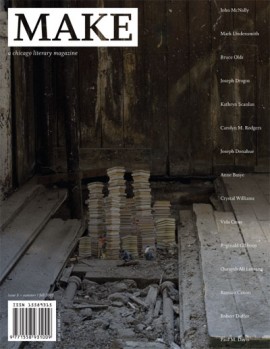
by Ramsin Canon

In Chicago during the 1880s, entrepreneurs, journalists, and mavericks adopted the following motto: We are for Chicago first, last, and all the time. This came from a time period and a city that embodied the American character, full of provincial bravado, quick cash, and surprising invention, but also an almost cruel sense of expansion, upward and westward. During this period, Chicago set about absorbing the prairie and the people of the prairie, as well as turning the base of Lake Michigan and the Chicago River into an innovative and necessary system of waterways, channels, harbors, and canals. Once on the river, working a flat sanitation barge westward for the Mississippi or jaunting on a small yacht eastward for the lake, the water system, much like Chicago’s boulevards and streets, spread from horizon to horizon, casting its influence nationwide. The river system and the prairie are a link to Chicago’s working narrative and history — one flushed and cultivated out of sheer will.
Chicago’s writers were gamblers with only a sawbuck to hustle, immigrants with Rockwell Avenue corner stores, and activists with brownstone rooftops and social services to fix. They were poets, novelists and journalists with rock steady, steel-eyes and wreckshop minds. They knew the greatest stories were found in the voting booths, in the class system of the wards, and in a kiss on a train platform. By recording the events that drive their daily lives and the lives of their neighbors, they laid the groundwork for the city’s biography.
Writing the biography of an American city means including all of its working and breathing systems. It means accounting for the city in the biography of an individual and accounting for all inhabitants in the collective. It means negotiating the contrasts and irregularities of its citizens’ lives and calling attention to injustices and marginalization without pandering or patronizing. It also means capturing a city’s humor and joy. Of course, one author or one movement cannot chronicle the complete history of a American city.
In this issue, we find both established and emerging writers that bear this standard and contribute to their individual cities’ unfolding narrative:
John McNally’s “Five Dead Guys” resurrects Chicago icons; a father and son become further estranged in 60s St. Joseph, Missouri in Mark Lindensmith’s “Tunguska Event”; Bruce Olds’s The Moments Lost vividly recreates Chicago’s golden age, and a period of tumult in American history; Kathryn Scanlan’s essay offers one woman’s personal account of arrival in the city while Joseph Drogos condemns misplaced nostalgia for the same city; the poetry selected by guest editor Ed Roberson touches on a range of themes, examining personal histories and petitioning the social conscience.
Sarah Dodson & Mike Zapata
editors, MAKE Magazine















click to see who
MAKE Magazine Publisher MAKE Literary Productions Managing Editor Chamandeep Bains Assistant Managing Editor and Web Editor Kenneth Guay Fiction Editor Kamilah Foreman Nonfiction Editor Jessica Anne Poetry Editor Joel Craig Intercambio Poetry Editor Daniel Borzutzky Intercambio Prose Editor Brenda Lozano Latin American Art Portfolio Editor Alejandro Almanza Pereda Reviews Editor Mark Molloy Portfolio Art Editor Sarah Kramer Creative Director Joshua Hauth, Hauthwares Webmaster Johnathan Crawford Proofreader/Copy Editor Sarah Kramer Associate Fiction Editors LC Fiore, Jim Kourlas, Kerstin Schaars Contributing Editors Kyle Beachy, Steffi Drewes, Katie Geha, Kathleen Rooney Social Media Coordinator Jennifer De Poorter
MAKE Literary Productions, NFP Co-directors, Sarah Dodson and Joel Craig